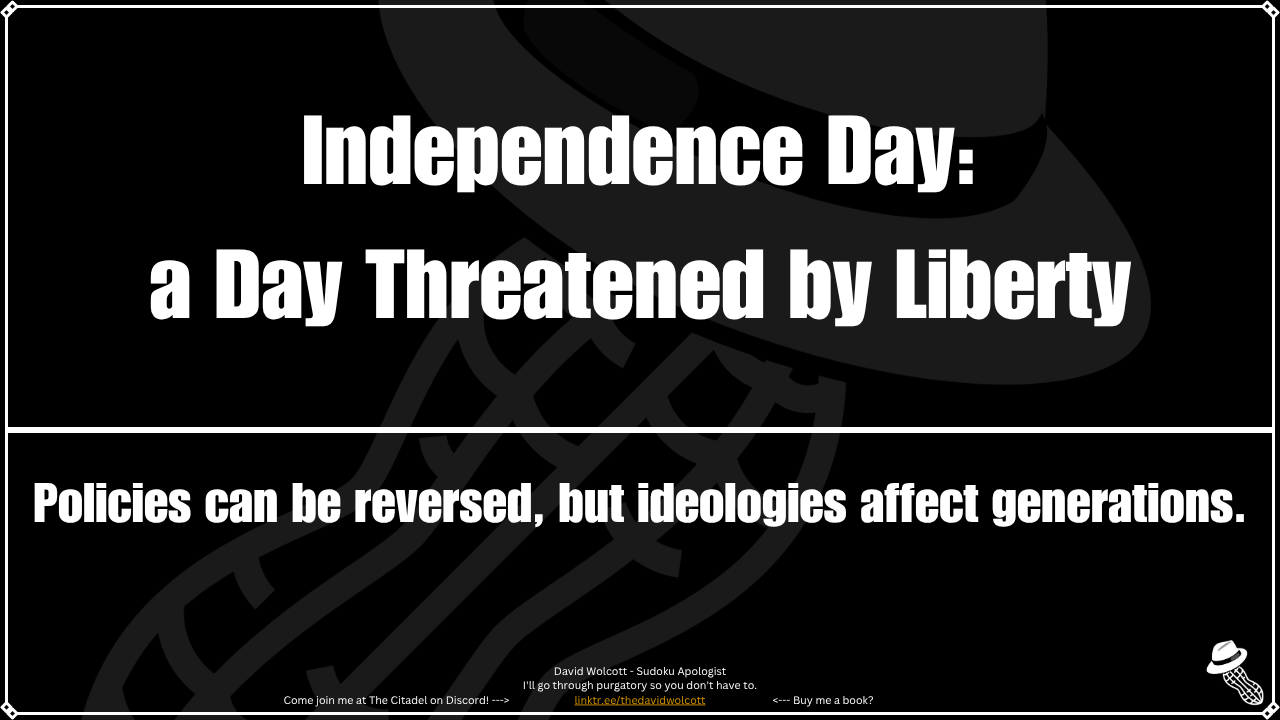Independence Day: a Day Threatened by Liberty
Jul 04, 2025
On this United States Independence Day, I’d like to remind us all of why this revolution, as opposed to so many others throughout history, was successful and resulted in ongoing increases in freedom and liberty. The American Revolution was not based on greed or wanton indulgence, but based on the desire for self-determination in light of much grander narratives; mainly, Scripture:
in a ten-year study undertaken at the University of Houston, researchers examined 15,000 documents (many unrelated to politics) from the founders and determined that 34 percent of the quotations came from the Bible, the highest of any source. The next highest was the French political philosopher Montesquieu at 8.3 percent, then the English legal scholar William Blackstone at 7.9 percent. John Locke came in at 2.9 percent. (Blackstone’s commentaries on the law, which guided the Supreme Court for over a century, also include a great deal of Scripture and argue that the Bible is the foundation for all law.) Whatever else can be said, it is clear from this study that the intellectual world of the founders was heavily influenced by Scripture.
Sunshine, Glenn S. 2009. Why You Think the Way You Do: The Story of Western Worldviews from Rome to Home. Grand Rapids, MI: Zondervan.
And yet, history, philosophy, virtue…. These are no longer taught, so we have a generation that, instead of seeking the life sought by the Reformers, are running headlong to the death promised by the Revolutionists:
How could this reign of terror happen in a revolution supposedly dedicated to liberty, equality, and brotherhood? The critical factor was the rejection of even the sort of formal Christianity found in England. As we have seen, from their earliest days, Christians had argued for the fundamental equality of all people based on their creation in the image of God and Jesus’ sacrificial death for all. Thus early Christians worked to abolish slavery and over time developed the idea of civil equality to accompany spiritual and moral equality. No other civilization anywhere in history ever moved in this direction—only the West, under the influence of Christian principles. Along with equality came the idea of inalienable, God-given rights, which led to the Enlightenment emphasis on life, liberty, property, and virtue.
But once Enlightenment ideas were cut off from their Christian foundation, they no longer had a solid base to preserve them. They were free-floating ideas that sounded good but lacked any underlying rationale to preserve them when social, political, and economic stress combined to make them less popular or expedient. The net result? In the name of freedom and equality, nonconformists, the wealthy, and other victims of the mob’s envy were executed.
Sunshine, Glenn S. 2009. Why You Think the Way You Do: The Story of Western Worldviews from Rome to Home. Grand Rapids, MI: Zondervan.
While the church is largely responsible for this, trading the requirement of spiritual maturity and discipleship from their congregations for pop “worship” songs and headcounts, yet all Americans, regardless of faith, can do something about this. All of us can seek truth, wisdom, learning from the past.
I would encourage you to read the works of Tom Holland (historian, not Spiderman), Abigail Shrier, Louise Perry, in addition to many of the great Christian minds of past and present: C S Lewis, J R R Tolkien, Thaddeus Williams, Nancy Pearcey.
Weigh carefully: policies can be reversed, but ideologies affect generations.

